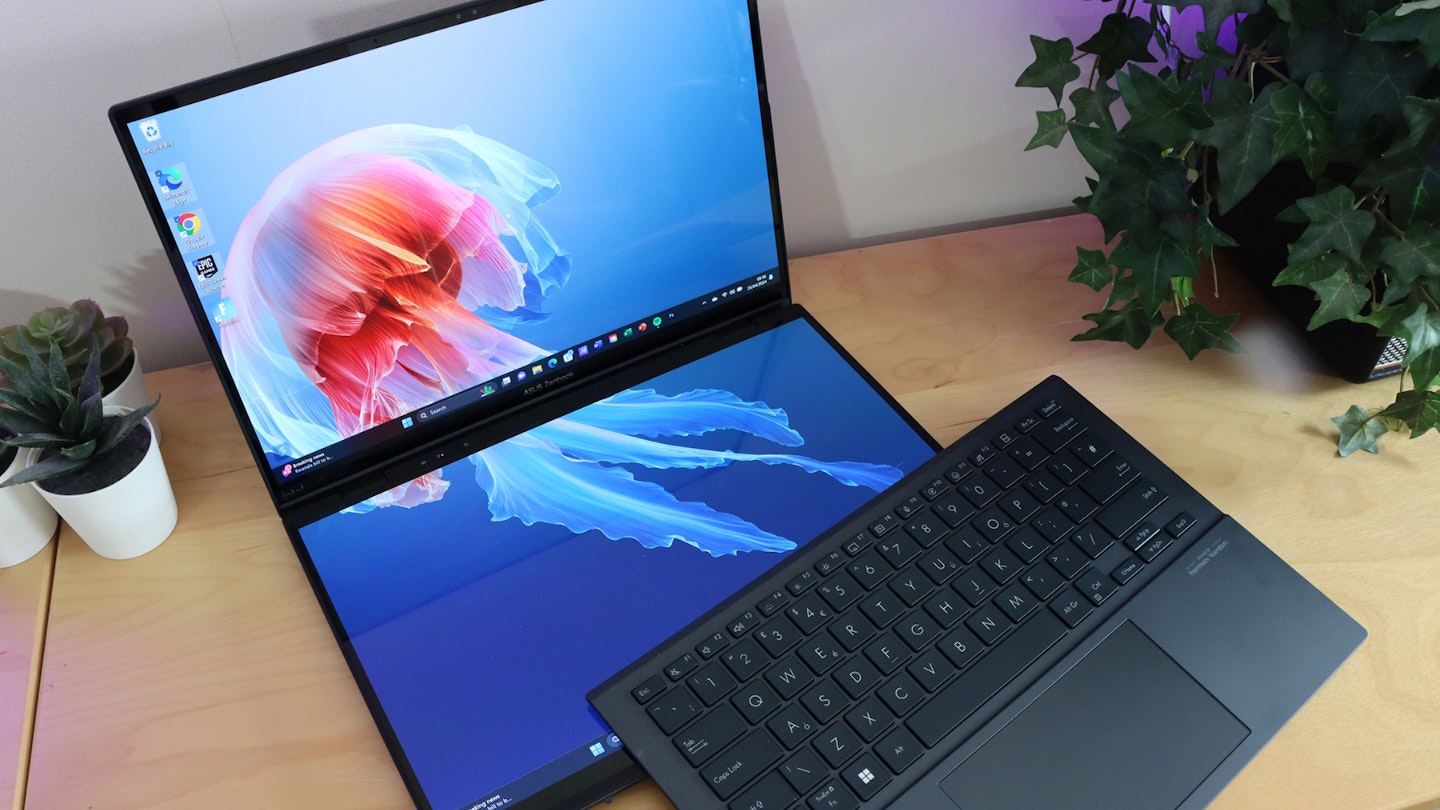One of the best things about owning a truly great laptop has to be raw power twinned with lightweight portability. Having a CPU with enough grunt, an SSD with loads of space and more RAM than you know what to do with are welcome luxuries. But, whether it's a budget model or a serious productivity tool, most laptops have one major limitation: a single screen. Two is better than one - and that’s exactly what the ASUS Zenbook DUO OLED laptop delivers.
And no, we’re not talking about a separate bundled monitor hooked up via a cable. We mean a 14-inch laptop with two full-size screens built into it. Yes, the Zenbook DUO laptop has the sort of internal spec that will satisfy power users and those looking for serious entertainment on the move. But, it’s the inclusion of not one but two OLED displays plus a dockable keyboard and trackpad that makes it something of a world-first.
Our resident tech expert Chris Duffill has rounded up his favourite apps and unfolded the Zenbook DUO OLED laptop to see just how useful that extra screen really is. But, is it a worthwhile upgrade for the average user, or an extravagance that only makes sense for a handful of users? Let’s find out.
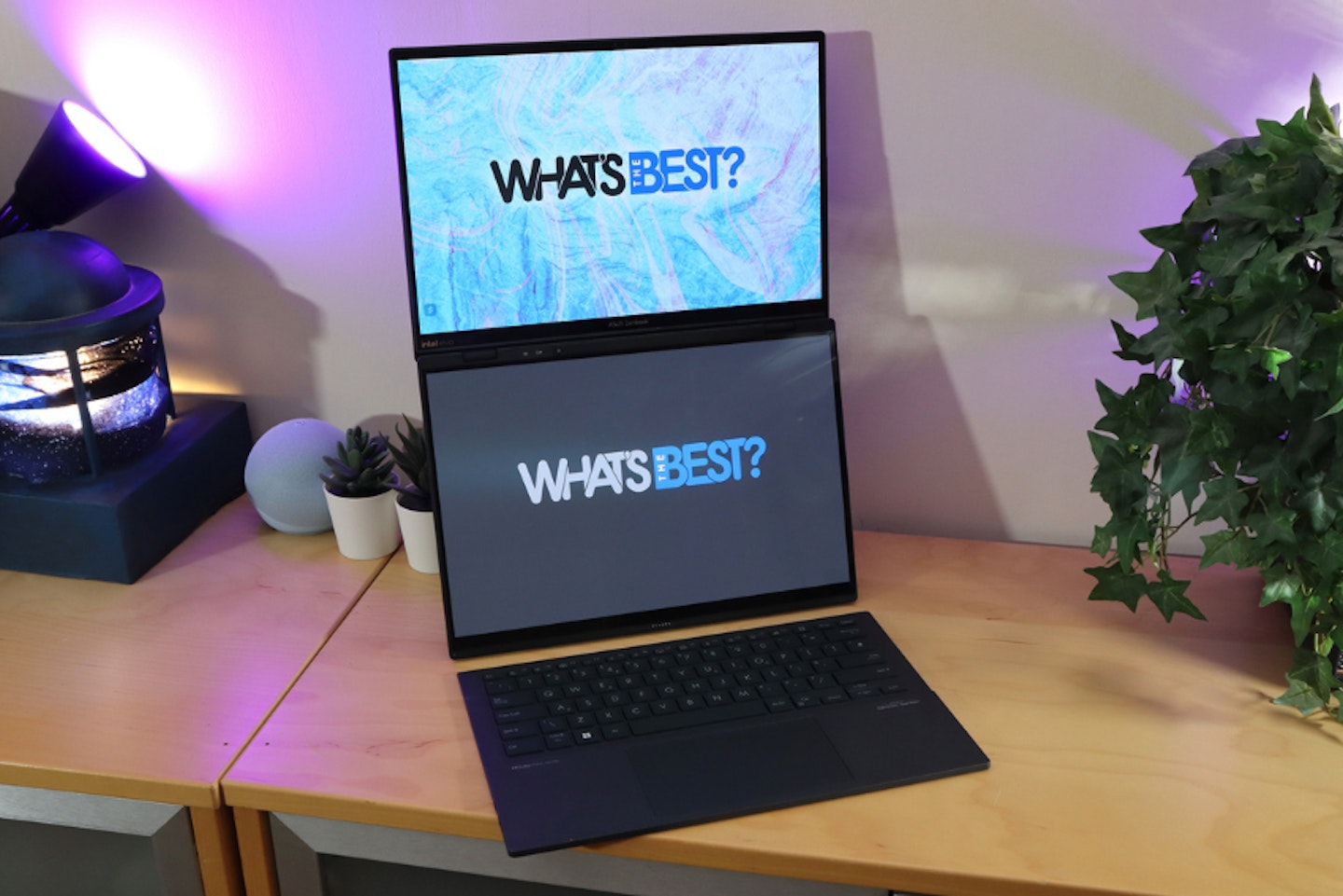
The Quick Version
The ASUS Zenbook DUO OLED laptop comes with well-thought-out touchscreen gestures and customisable workspaces to let you make full use of those twin displays. But this is more than just a laptop with an extra screen. The 32GB of RAM and 2TB solid state drive are a great match for the Intel Ultra 9 processor, making it a seriously powerful alternative to a desktop PC. The expanded screen real estate is particularly useful for multitaskers and creatives, providing plenty of room for multiple windows, workspaces and toolbars. In dual-screen mode, removing the dockable keyboard and trackpad also makes this something of a practical portable office setup.
For media, the Harmon Kardon speakers with Dolby Atmos and Dolby Vision for HDR visuals deliver a satisfying movie and music experience. Creatives will love the extra OLED screen space for apps like Photoshop and Premiere. Gaming is also possible here, with decent performance from Rocket League with stable 60fps framerates. Build-wise, whether the keyboard is docked or removed, the ASUS Zenbook DUO feels reassuringly solid and well-built. The low-profile keyboard is backlit and well-spaced for accurate typing. Battery life is respectable, but is of course greatly reduced when using it in dual-screen mode. This laptop delivers on all levels, providing power, portability, practicality and a premium user experience.
All prices are correct at the time of writing. Prices, stock and deals are subject to change without notice.
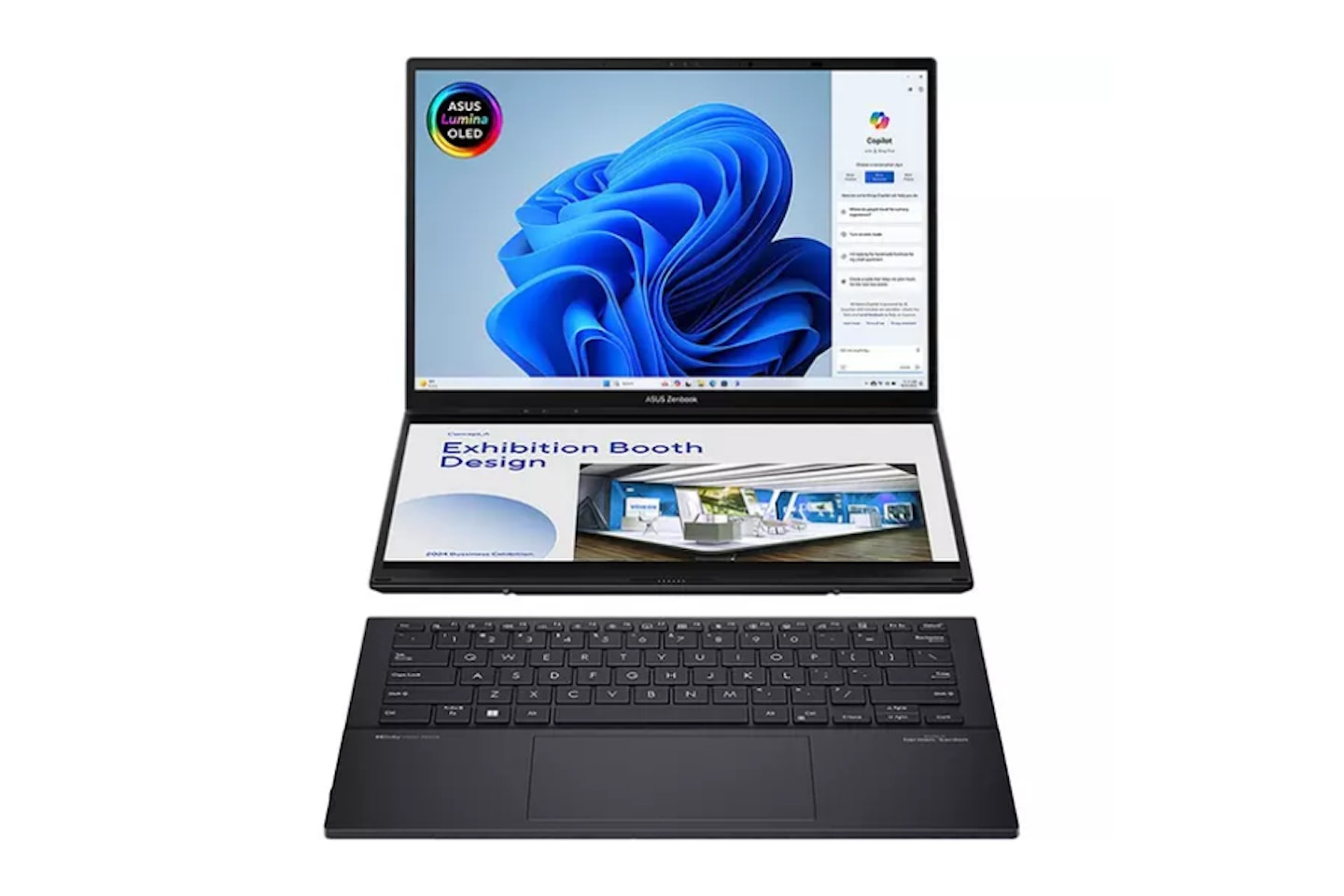 ASUS
ASUSao.com
Pros
- Highly practical and usable dual OLED touchscreen displays with integrated stand
- Lots of raw computing power and fast storage for more advanced tasks and apps
- A premium look and feel with solid build quality
Cons
- Using two screens at once will impact the battery life
| CPU | Intel Core Ultra 9 Processor 185H 2500Mhz, 16 cores, 22 Threads |
| GPU | Intel Arc Graphics |
| RAM | 32GB |
| Storage | 2TB M.2 NVMe PCIe 4.0 SSD |
| Display | Two 14.0-inch touchscreens, 2.8K (2880 x 1800) OLED 16:10 aspect ratio, 400nits peak brightness, 100% DCI-P3 color gamut, DisplayHDR |
| Battery life | 75WHrs (around 6 hours under average use with one screen) |
| Dimensions | 31.3 x 21.7 x 1.46 ~ 1.99 cm |
| Weight | 1.66kg (with keyboard) |
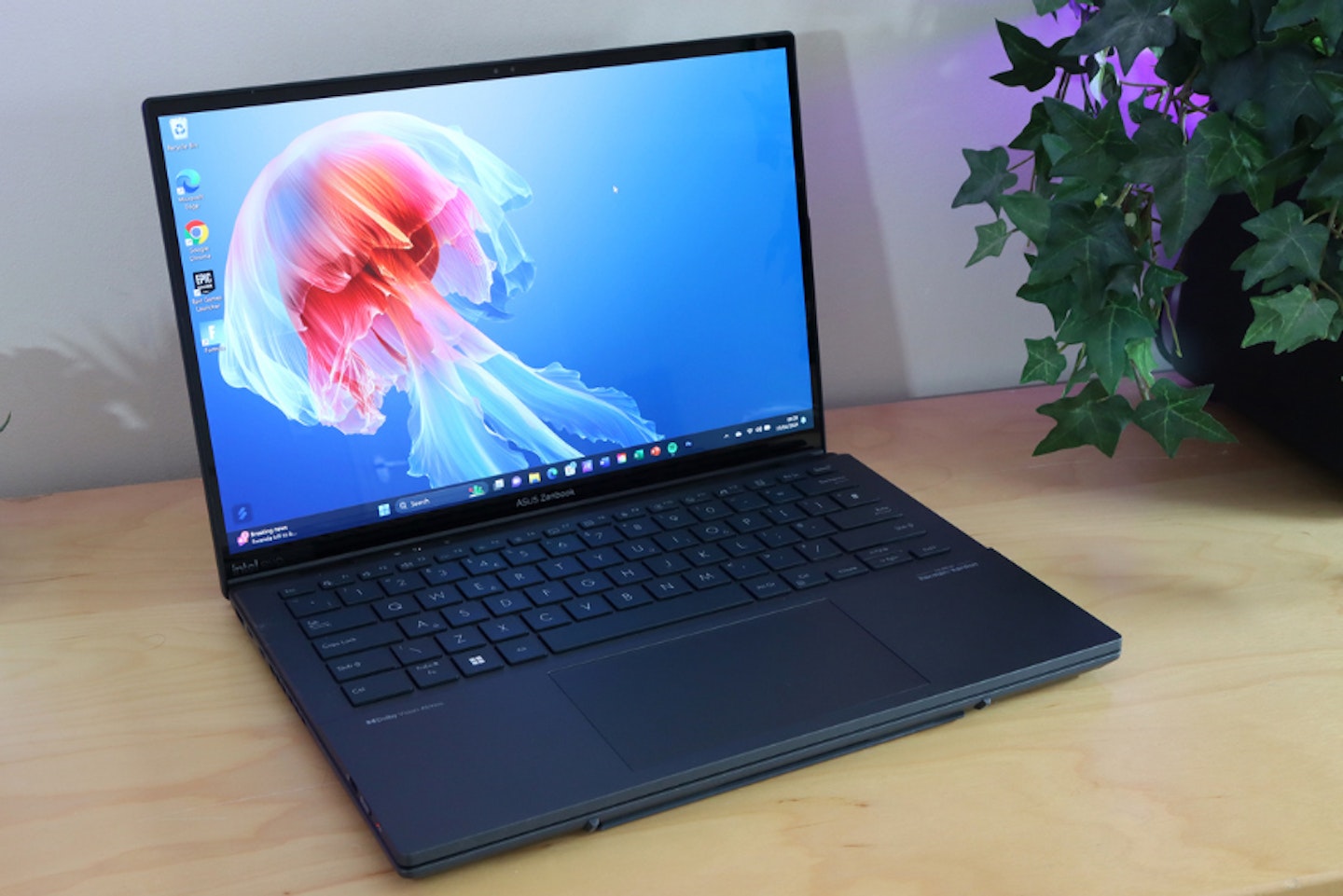
Performance and user experience
ASUS Zenbook DUO OLED: First impressions
Having expected this to be slightly clumsy to handle and set up thanks to having two screens, I was happy to unfold the Zenbook DUO to find a very normal-looking laptop. The docked keyboard and touchpad only add a few millimetres to the lower section that houses the extra screen. When folded, its height is comparable to other laptops at just under 2 cm.
Although this clearly has top-of-the-line audio and video capabilities, it’s those twin screens that I was itching to try out. I was hoping that there would be some clever additions to help me manage my workflow across the two.
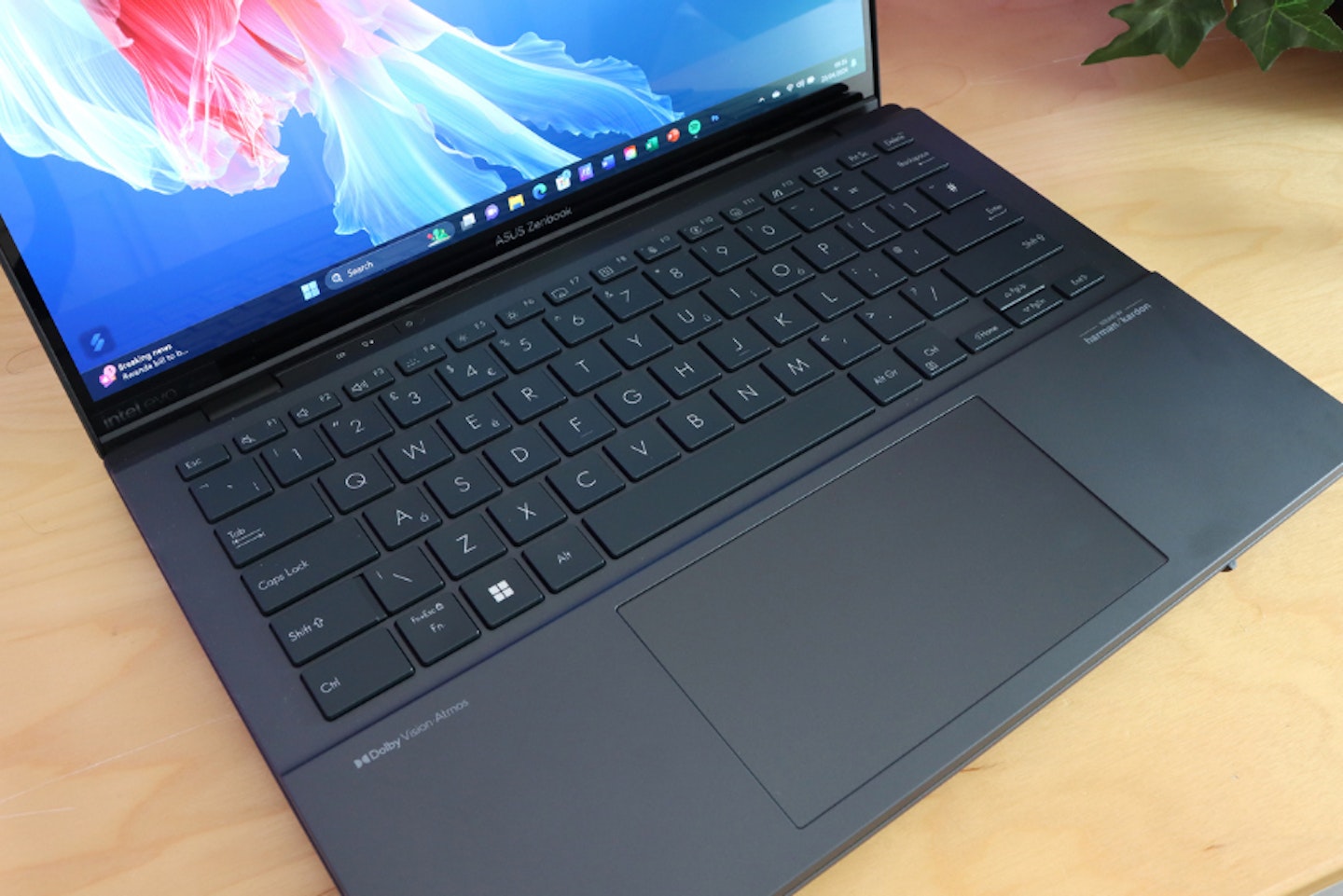
ASUS Zenbook DUO OLED: Under the hood
Somehow ASUS has crammed some seriously powerful components behind that lower screen. The 2TB SSD is a step up from many laptops out there, offering plenty of fast storage for professional applications. The 32GB of RAM is also perfect for powering those apps and tasks. But it's the latest generation Intel Ultra 9 processor that gives this system the grunt it needs to utilise the rest of the spec. That makes it a more than capable choice as a business laptop as well as a seriously powerful creative tool.
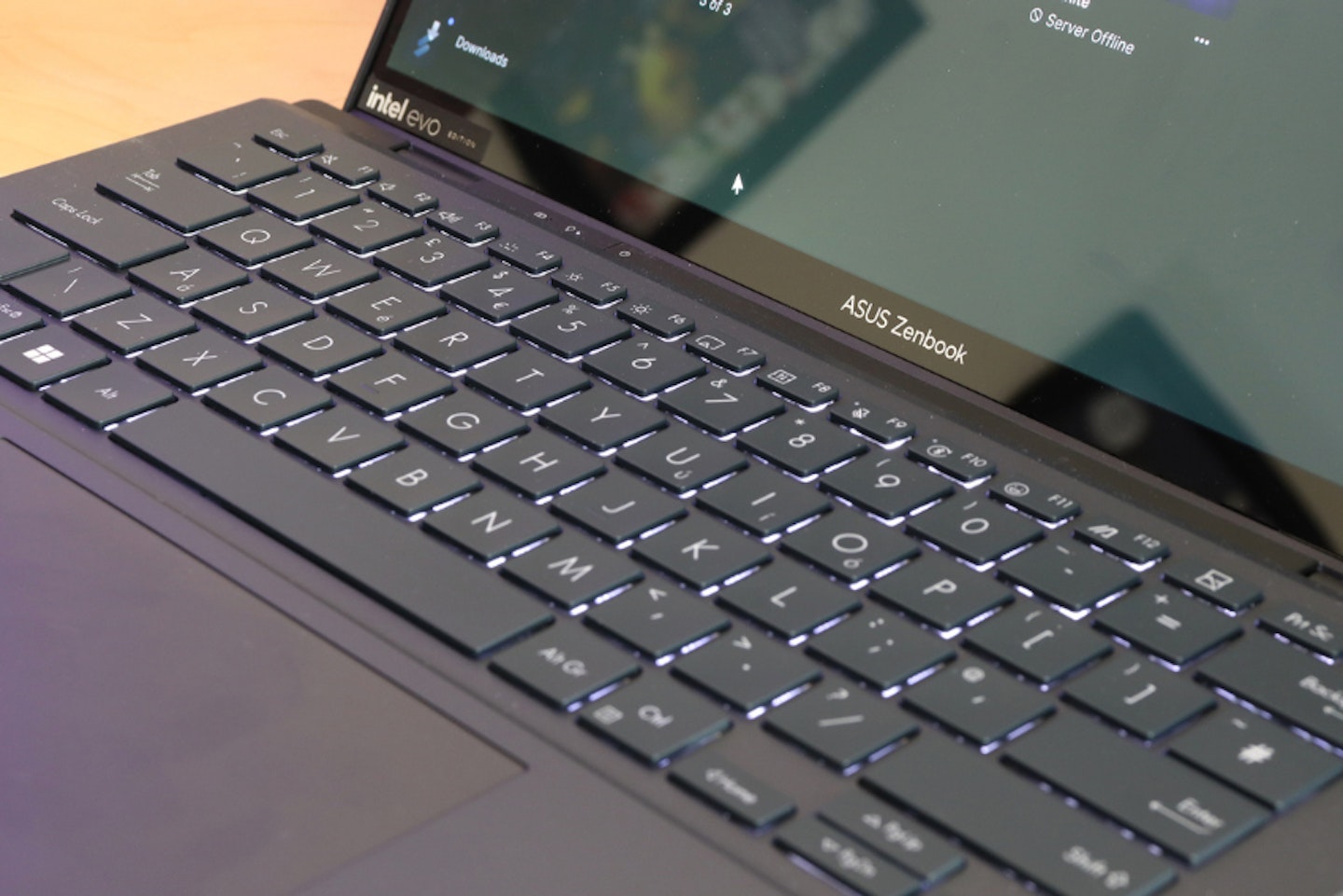
ASUS Zenbook DUO OLED: Everyday use
Despite wanting to fully test those two screens, I did my initial setup and installs with the Zenbook DUO in single-screen mode. For me, this also best represents the typical everyday use of this laptop - given that dual screen mode can’t be used while perched on your lap or on public transport. Used as a normal laptop, the DUO is excellent - the keyboard is accurate and responsive and the integrated trackpad is a decent size. I found that using it for emails, documents and web browsing was smooth and intuitive. And that main OLED display is beautifully clear and vibrant with excellent viewing angles and black levels. The fact that the screens are both touchscreens gave an extra layer of control too.
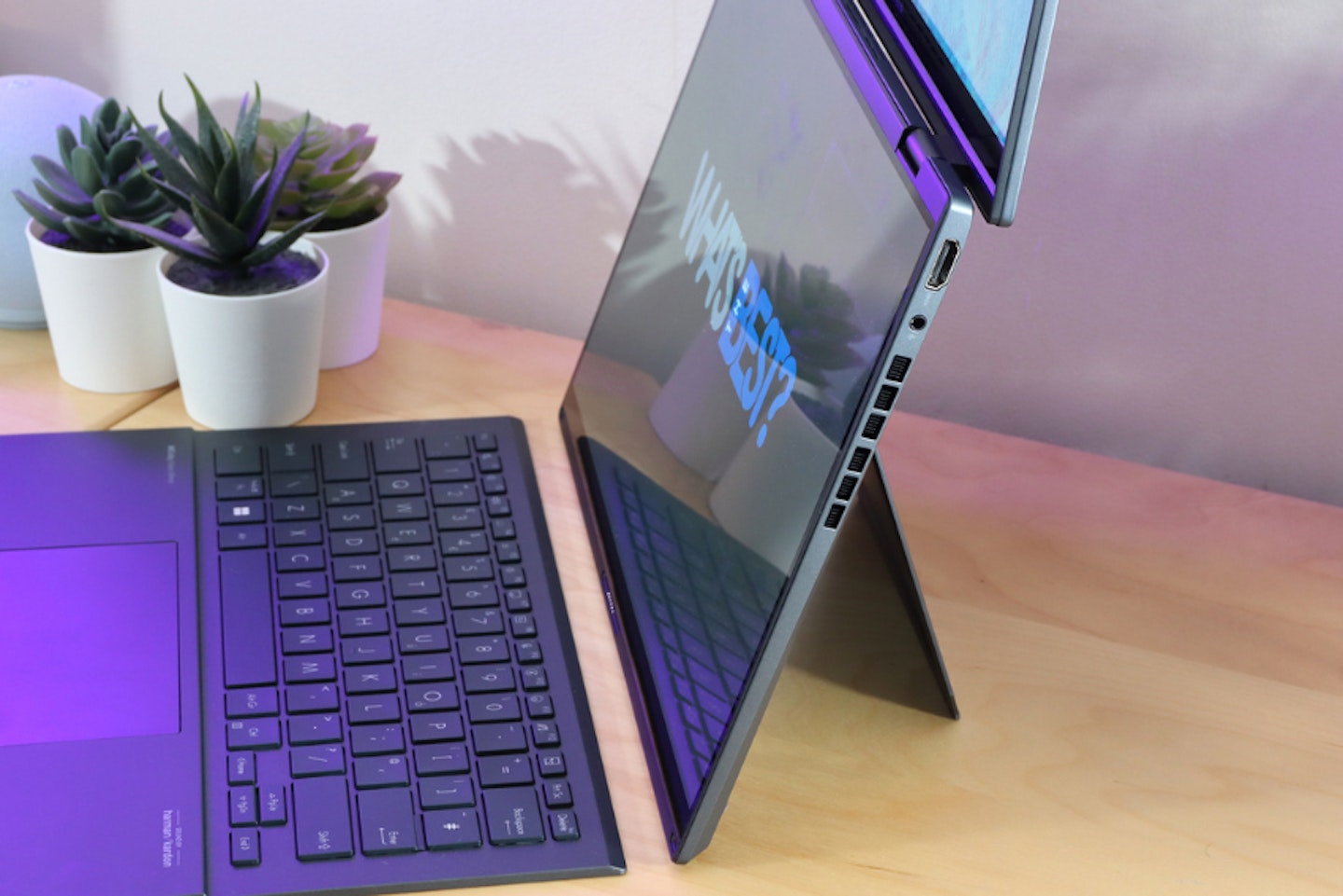
ASUS Zenbook DUO OLED: Dual screens
My PC system at home is a multi-screen setup, so I was really keen to test the Zenbook DUO’s twin displays. Lifting the keyboard off automatically powered on that second display, extending the desktop with it. I flipped open the stand and stood the laptop up in dual-screen mode. It was then I realised that other laptops I’ve used are woefully inadequate by comparison.
The integrated metal stand is sturdy and supports both screens perfectly. It’s all very well having a second display, but I wanted to know how well it had been integrated in terms of software. Thankfully, ASUS has included its ScreenXpert widget that provides a popup Control Center for quick access to various settings - including gestures to help manage those screens plus widget-like utilities. Thankfully, those utility widgets can be shown or hidden using touchscreen gestures too.
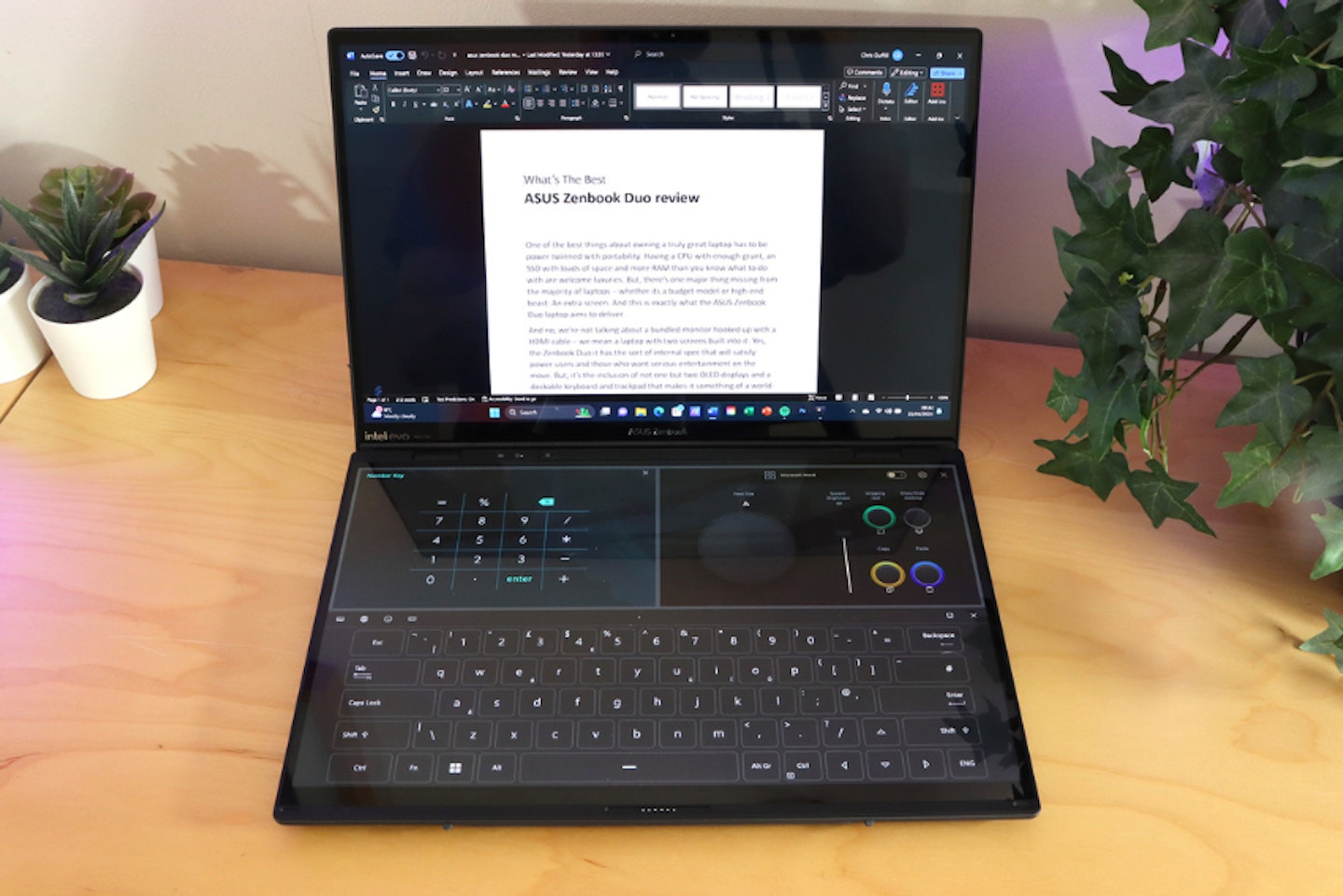
Touchscreen functionality
Much like a tablet, there’s a good range of gestures here. I particularly like using five-fingers to expand a window to full screen, and the excellent single-finger gesture to ‘flick’ an application from one display to the other.
And those gestures are put to use when using the laptop without the keyboard and touchpad, too. By swiping upward with the fingers of both hands, a virtual keyboard and touchpad slide up on the lower display. I decided to fill the rest of the space with some of those handy utilities - a numpad and volume and media controls. I can see why ASUS has done this - it is a logical addition for anyone who isn’t using the real thing. Plus it makes use of the lower screen as an input device. In practice, however, I found typing onto the glass while looking at the other screen was a little tricky, inciting plenty of typos. That said, if you forget your keyboard or want dual touchscreens only, the option for a virtual keyboard is a necessary addition.
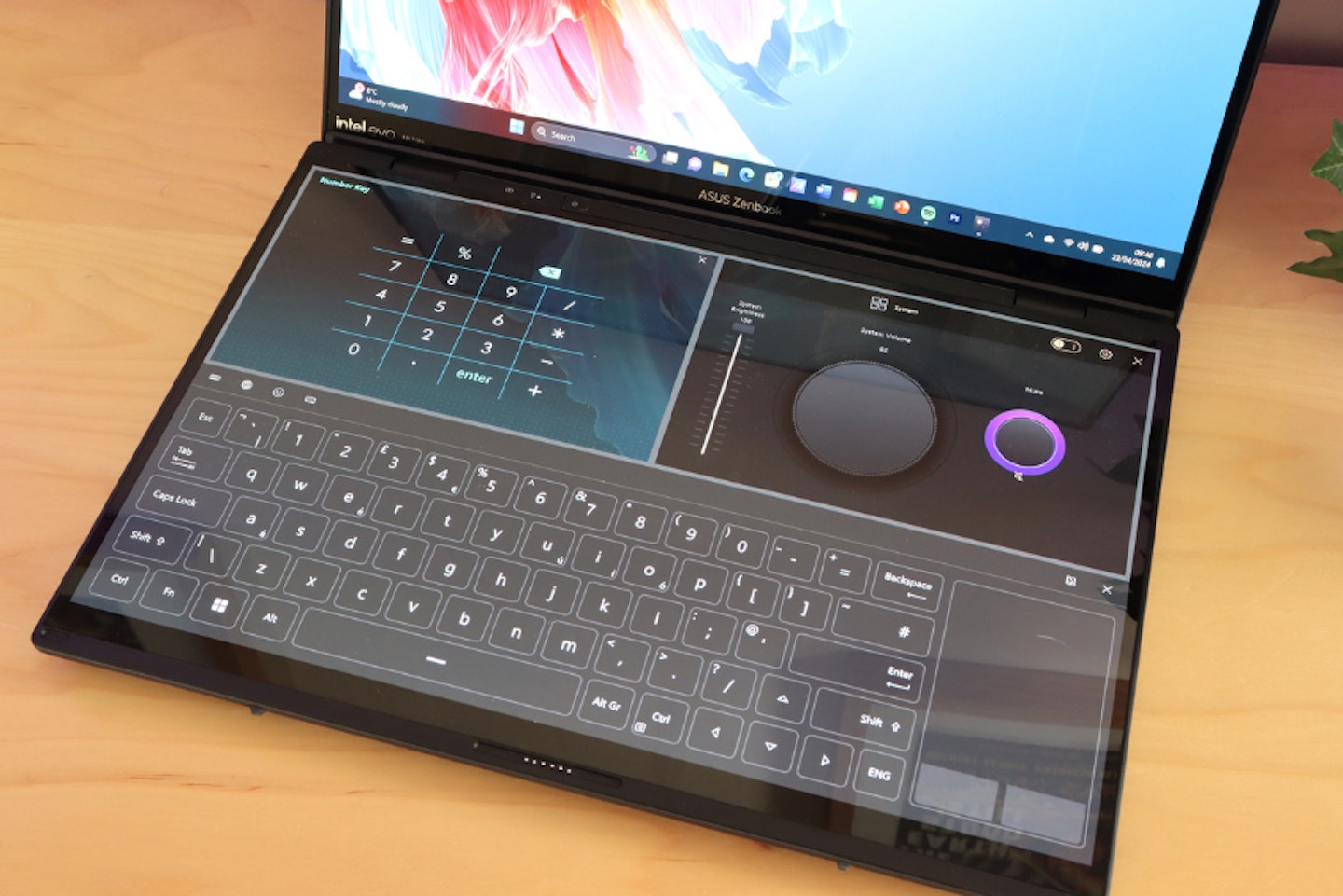
Portrait mode
As a long-time convert to dual screens and their workflow and productivity benefits, I wanted to know if I could use them in portrait mode. I decided to write this article in Word on one and use the other for a budget spreadsheet in Excel. Although possible, the built-in stand doesn’t swivel to provide proper support - so if you do prefer a vertical screen and document layout you’ll need to prop the DUO on a tiltable laptop stand. Also, for anyone hoping to use this as a touchscreen tablet, the screens don’t fold back more than 180 degrees. But, that’s not really the purpose of this machine - the two screens together are the real draw here.
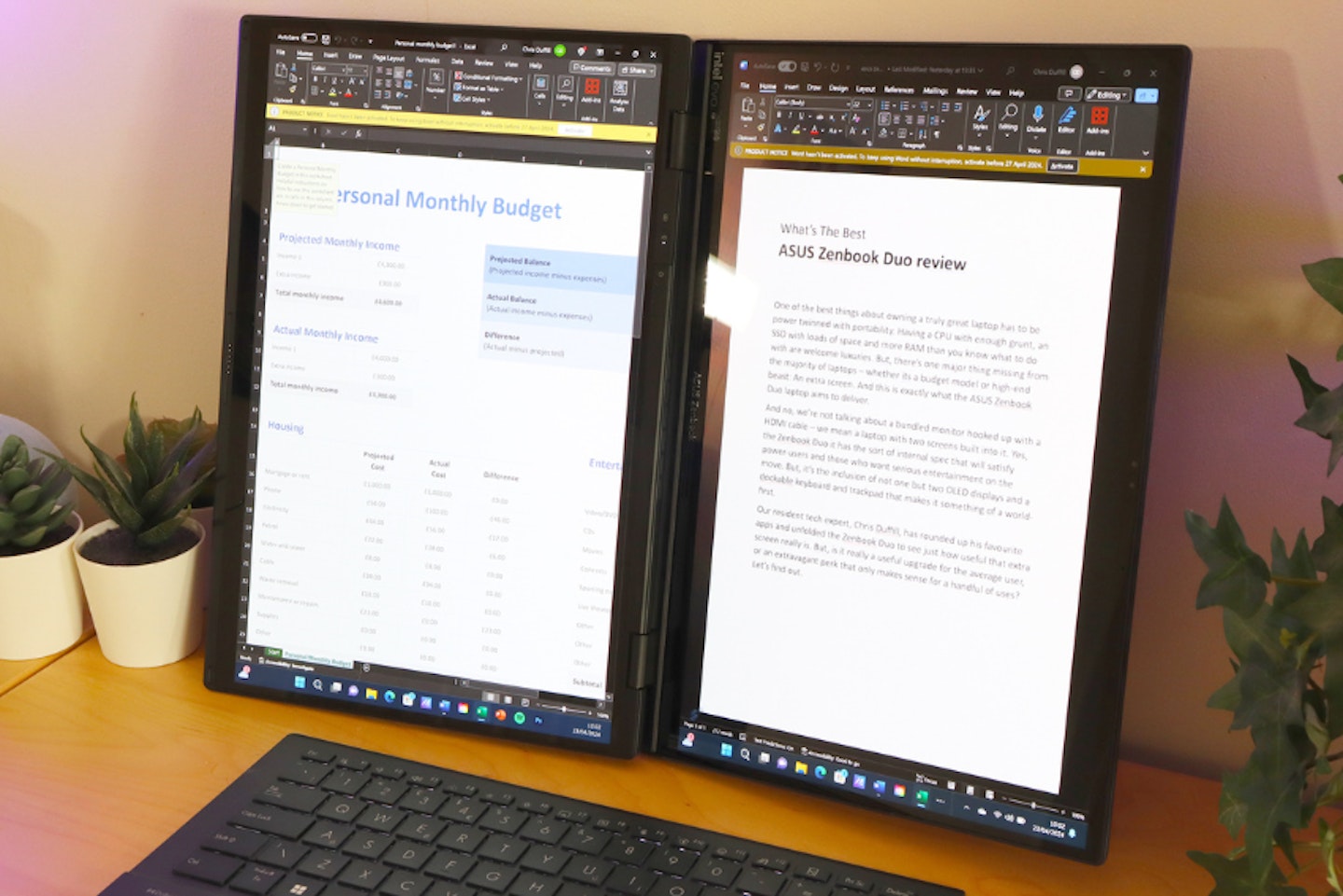
ASUS Zenbook DUO OLED: Creativity
Much like the ASUS Zenbook 14 OLED laptop that I reviewed recently, the touchscreens on offer here are pen-compatible; Although the ASUS Pen doesn’t come as standard with the DUO. That said, as a designer and video producer in a previous life, I knew that the additional screen would make this laptop a must-have for creatives.
I installed Adobe Photoshop and immediately arranged my workspace to make the best use of that second display. All of my tools and panels were arranged on the lower screen, leaving loads of room for image editing above. All in all, it’s probably one of the best laptops for photo editing on the market. Anyone using this for video editing will love being able to put their timelines on the lower screen too. Also, thanks to the RAM and CPU on offer here, the tools were super-responsive. The load time for Photoshop is well under the 5-second mark.
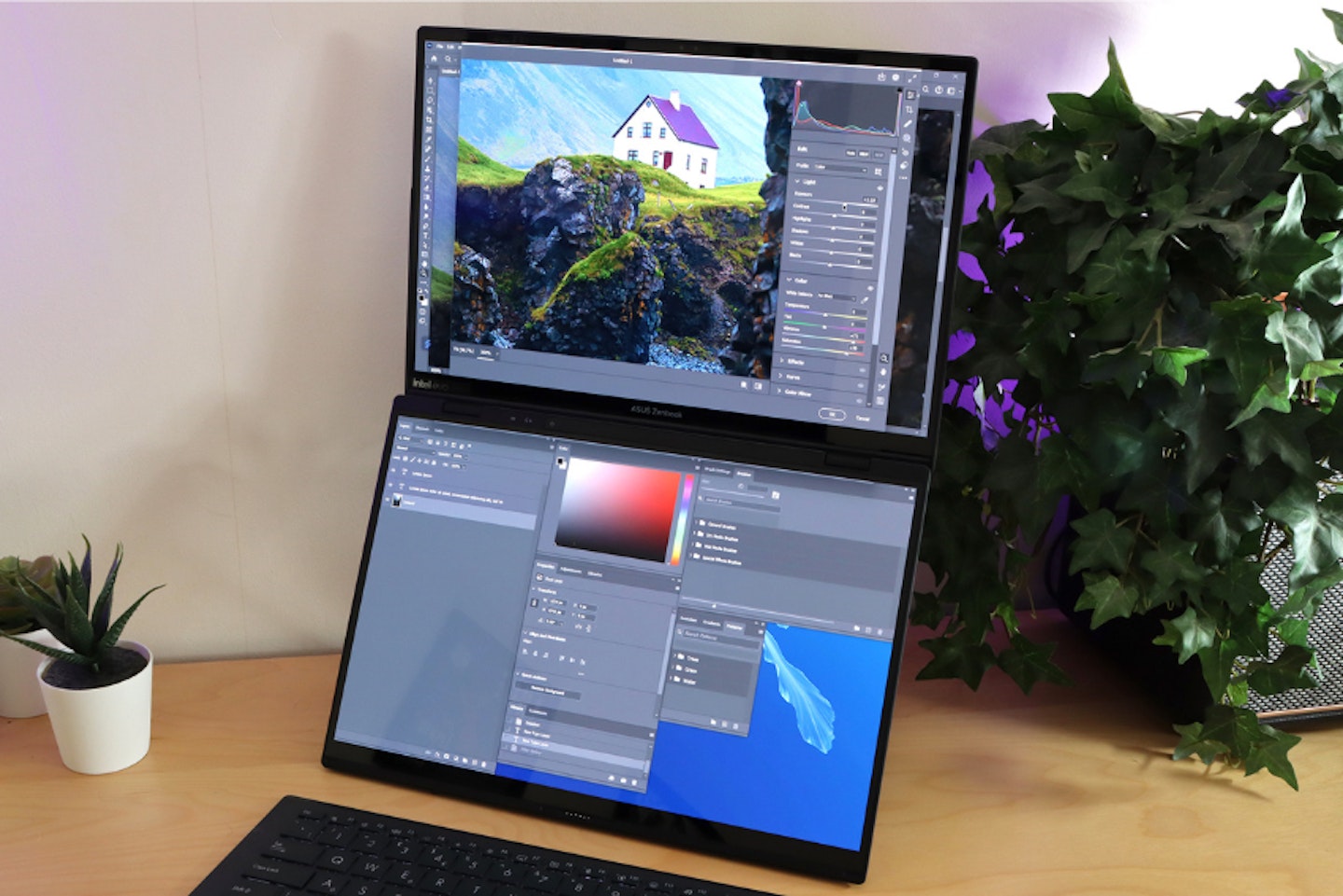
ASUS Zenbook DUO: Entertainment
Given that I was already impressed by the OLED panels, I wanted to try out some HDR video as well as test those Harmon Kardon speakers. Watching punch-fest The Expendables on Amazon Prime provided lots of rich visuals and Top Gun Maverick gave me some worthwhile Dolby Atmos sound - surprisingly so for a 14-inch laptop. The trailer for Deadpool & Wolverine on YouTube and the first season of Wednesday on Netflix were equally satisfying in terms of vibrant OLED colours and inky blacks. All in all, it made me think that this laptop is the ideal holiday companion for all of your entertainment. I also loved that I could look things up on IMDB on one screen while watching on the other.
Spotify Premium is my streaming music service of choice. S,o I put the speakers through their paces using some rock and metal. As good as the speakers are, they’re no match for a dedicated speaker when it comes to bass and sheer musicality - but they certainly don’t disappoint either.
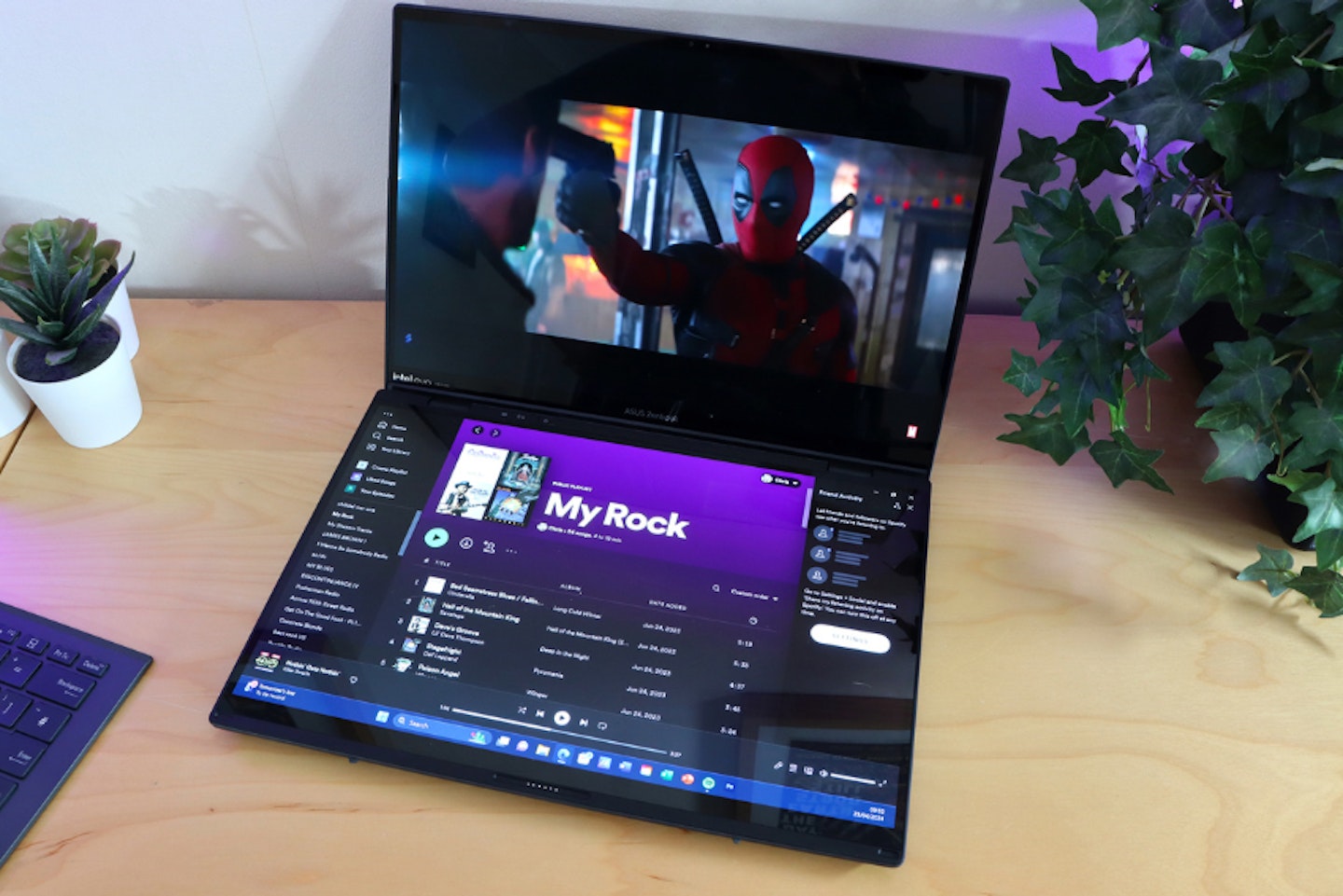
ASUS Zenbook: Gaming
Much like other ASUS laptops in this price range, the Zenbook DUO uses integrated Intel Arc graphics. Although this GPU isn’t aimed at gamers, I was pleasantly surprised to find that Rocket League would run at a smooth and stable 60fps at standard settings. I suspect that this performance is partly down to the overall RAM and CPU spec that effectively supports the performance of the GPU. So, while it may not be a dedicated gaming laptop, it is capable of delivering in this area.
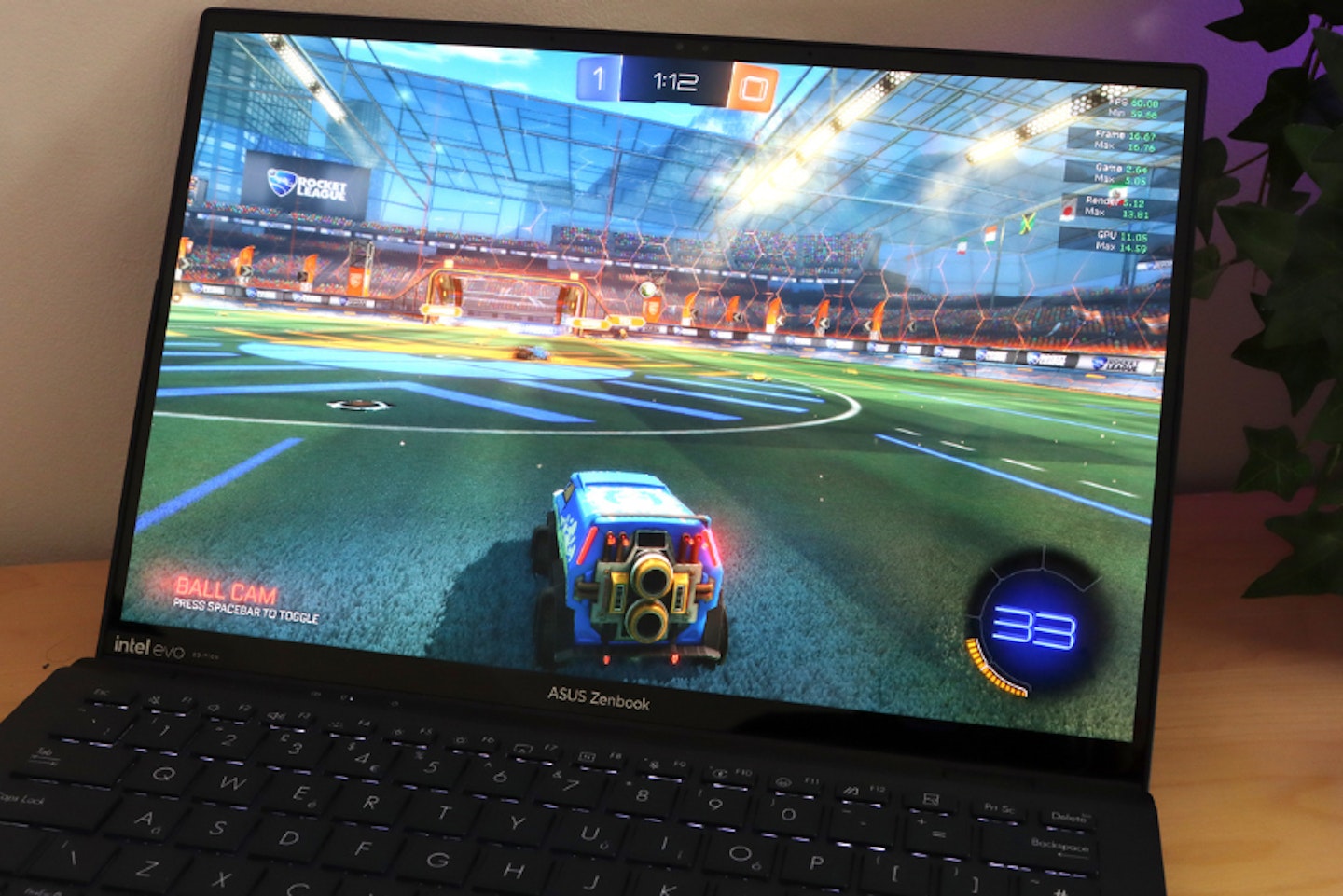
Build
Case build and design
Robustness and weight were my initial concerns when I first heard about the Zenbook DUO OLED. Thankfully the addition of that extra screen hasn’t made it unwieldy or too chunky - coming in at a shade under 2 centimetres high when closed. It’s also not flimsy, despite maintaining a slim main chassis. The solid metal build is evident as soon as you pick it up. Opening the lid and undocking the keyboard results in no unwelcome flexing and each component feels reassuringly weighty - and yet the whole thing is still a reasonably light 1.66kg.
The overall design is understated and screams ‘premium’ - with a subtle gridline motif on the outside. There's also a chrome ASUS logo under the main display and low-key Dolby and Harmon Kardon logos either side of the touchpad.
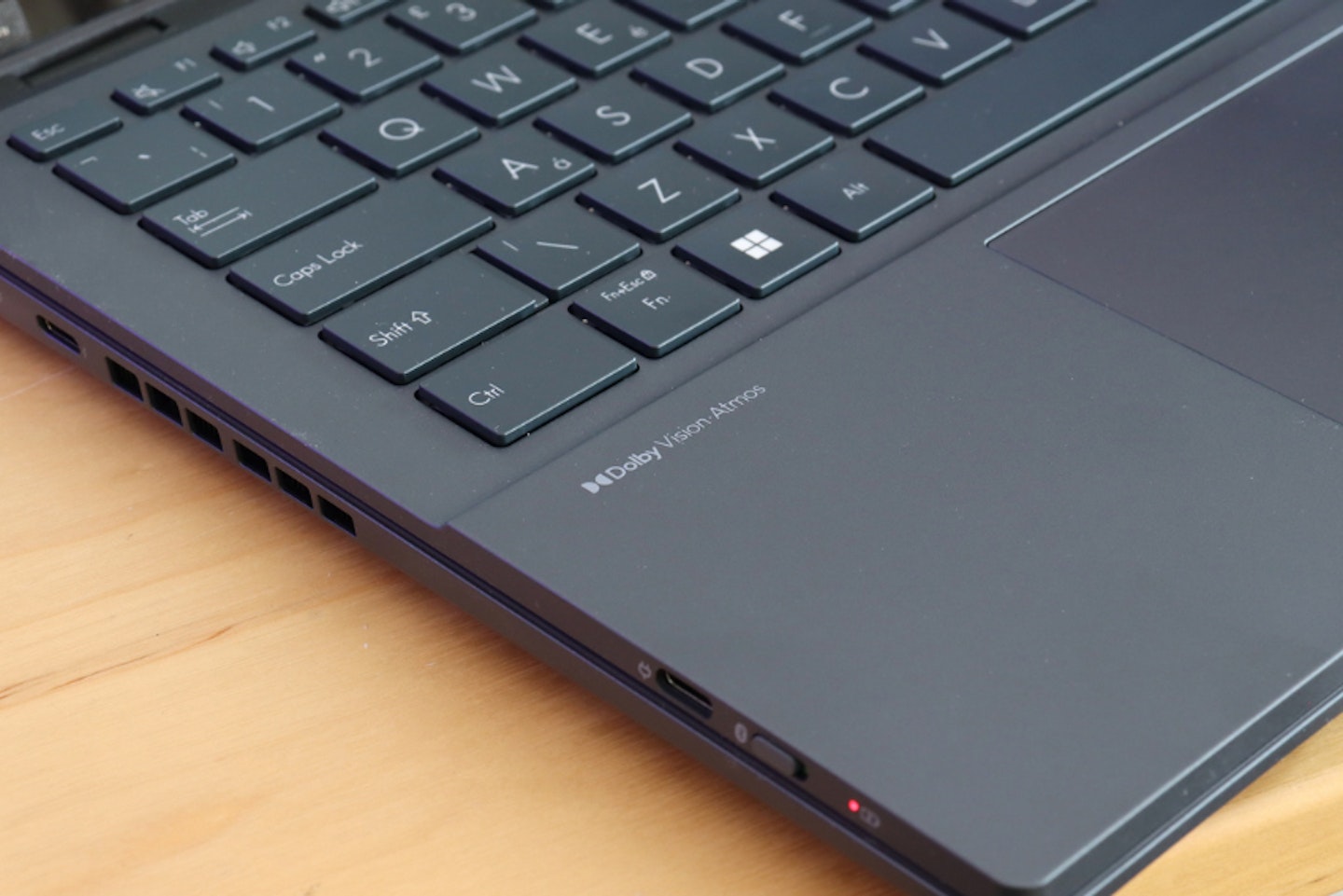
Displays and camera
Yes, this laptop really is all about the displays - and I’ve lauded their twin 2.8K OLED goodness above. However, it’s worth mentioning that the bezels are thin, the coating is glossy (but seems to handle reflections fairly well) and - importantly - each screen is a perfect colour match for the other right out of the box. So, if you’re like me and obsess over things looking consistent across a dual-screen setup, this one won’t need any tweaking.
Elsewhere, I found the touchscreen functionality to be accurate and responsive - including those gestures for controlling window sizes and positions. I also appreciated that the upper screen has an integrated camera which supports face ID for easy login with Windows Hello. If you’re concerned about privacy, though, it’s worth mentioning that there’s no physical shutter for the lens. It’s also only a 1080p camera, so while it’s not up there in terms of resolution, it’s fine for video calls and the like.
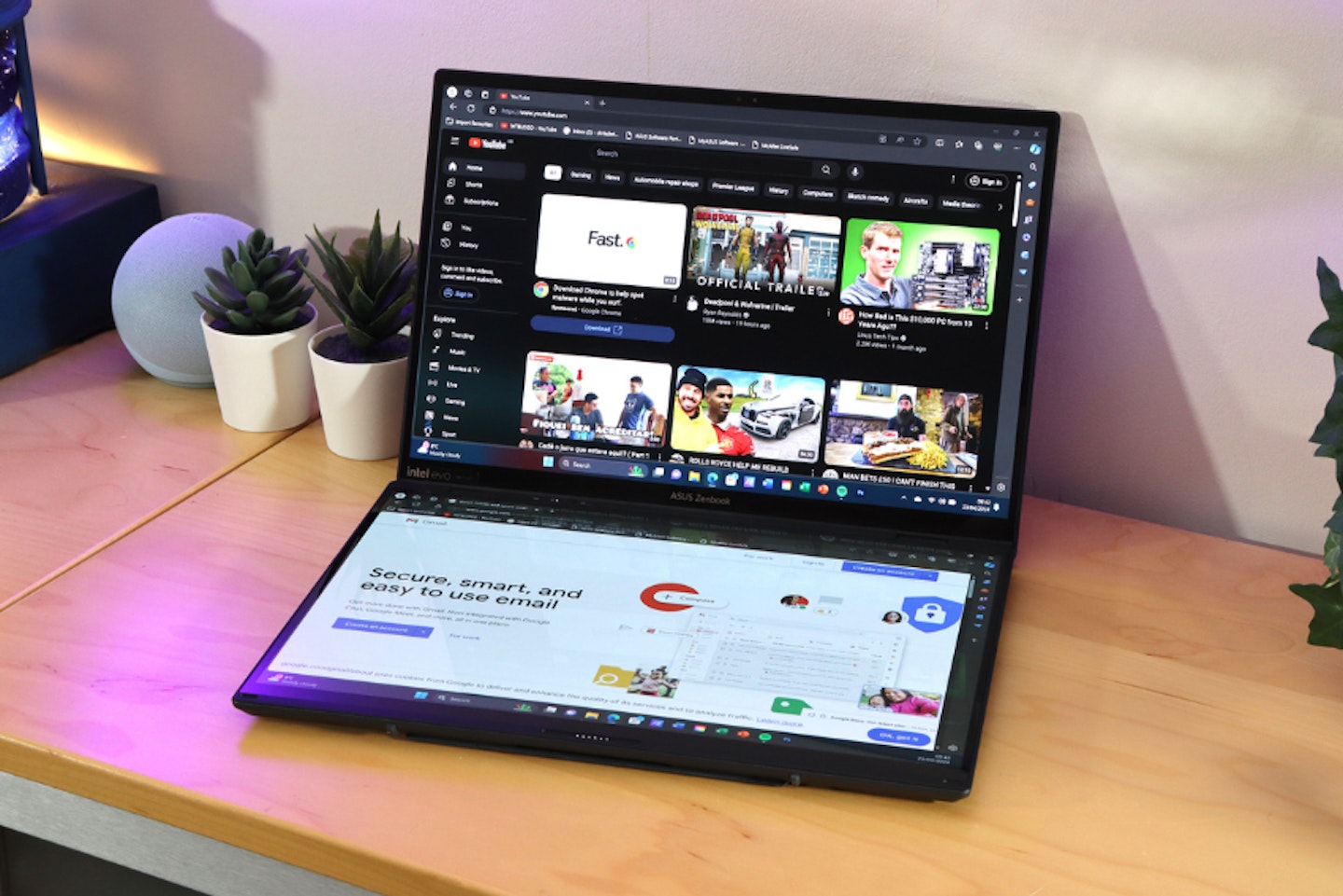
Ports
As with many modern Windows laptops, ports are a little on the thin side - but those that are present on the Zenbook DUO are well-positioned and practical. There are three Thunderbolt 2 (USB-C compatible) ports for everything from power to daisy-chaining peripherals and connecting external displays, to a standard HDMI port, a USB-A port and a 3.5mm audio jack. Anyone who still uses wired networking will be disappointed though, as this only has wifi for network connectivity. Bluetooth is present to support the keyboard and trackpad when it’s undocked, as well as for other compatible devices like a mouse or headphones.
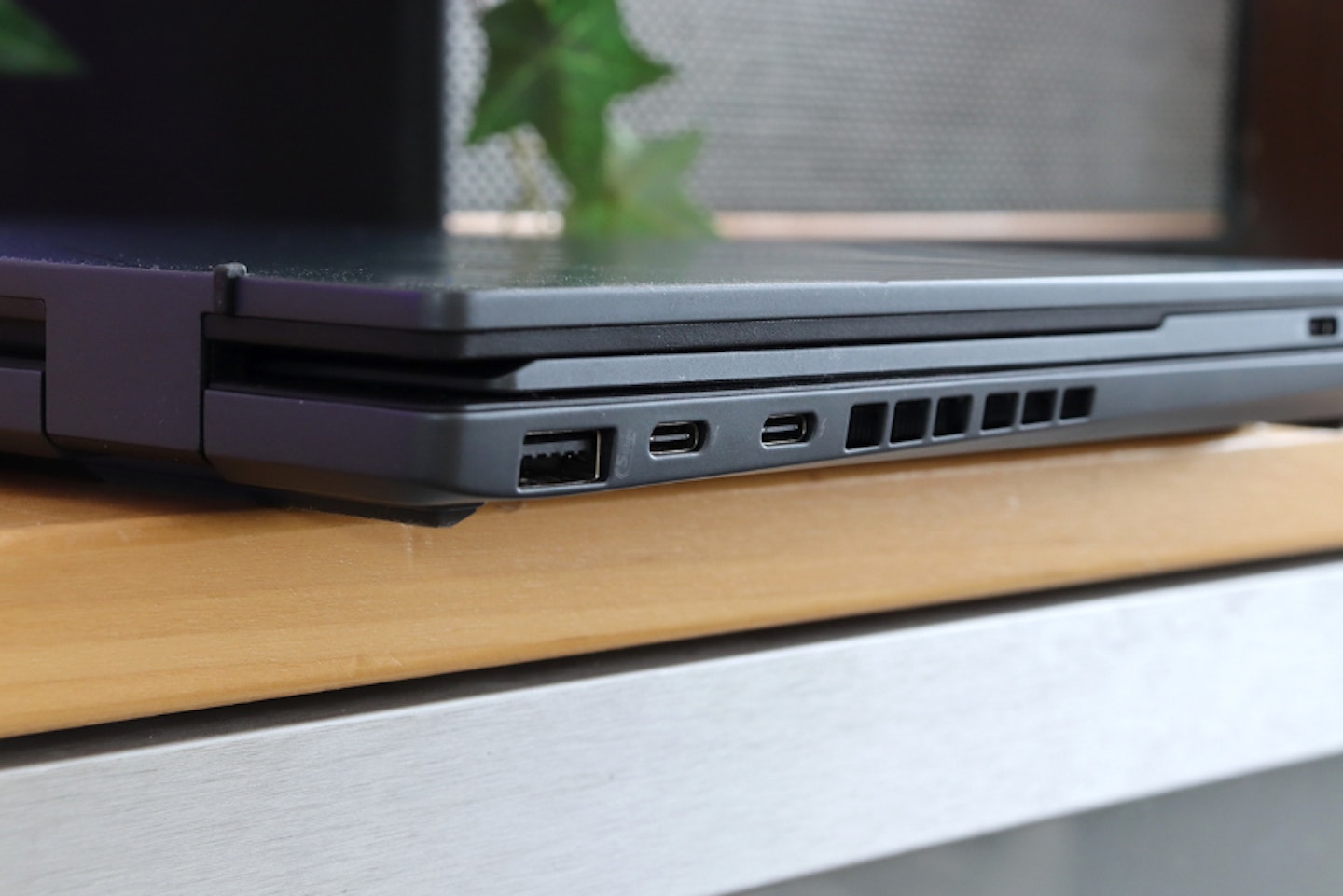
Battery life
While it’s not fair to complain about the battery life on a laptop that sports two OLED screens, heavy use away from a mains socket is going to present something of a challenge. Firstly, in single-screen mode, this laptop can achieve a reasonable 6 hours under average use. So, it’s not going to compete with some others out there. But, given the high-end components here, it’s not that bad at all. However, unfold the Zenbook DUO and use those two OLED screens at once and you’ll immediately see your estimated battery life reduced by well over a third. Unsurprising really, but I think it’s an important note in the margin for anyone considering dual-screen use away from the mains.
Fans, noise and heat
In my experience, the Zenbook DUO is extremely quiet - even under heavier workloads. I noticed no intrusive fan noise and the heat wasn’t too different from the average laptop. That’s quite a feat, considering the high-power tech under the hood. I would expect the heat to become noticeable for anyone pushing the system hard by editing video for several hours for instance.
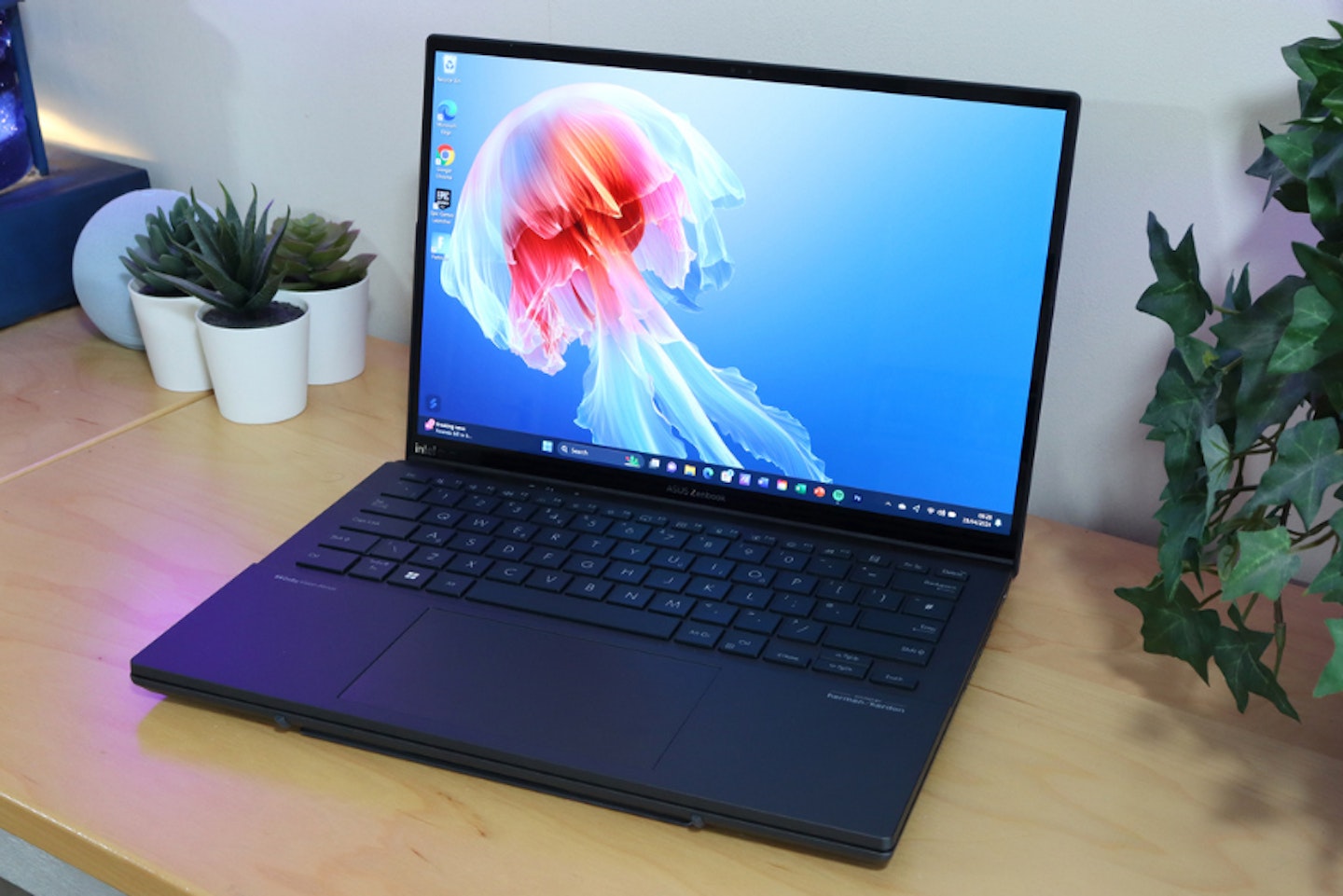
Price and competition
As something of a world-first when it came out, the rest of the market is thin on the ground when it comes to true dual-screen laptops. That said, the Yoga Book 9i from Lenovo is a clear contender. It offers an Intel Core i9 CPU, a 1TB SSD, 16GB of RAM and two 2.8K 13.3-inch OLED touchscreens. It’s not the powerhouse that the Zenbook DUO is in terms of raw computing power, those screens are a little smaller (and there’s no trackpad) but it’s the only other dual-screen laptop that comes close.
If you’re less concerned with the underlying hardware but still want the usability boost of a second display, the ASUS ZenBook Duo UX482EAR 14-inch Laptop is a great option. As a laptop under £1000, it’s not as powerful as the Zenbook DUO OLED, but the Intel i7 processor, 16GB of RAM and 1TB SSD is a solid choice; Plus you have a small second touchscreen display to give you that bit more room for toolbars, panels and more.
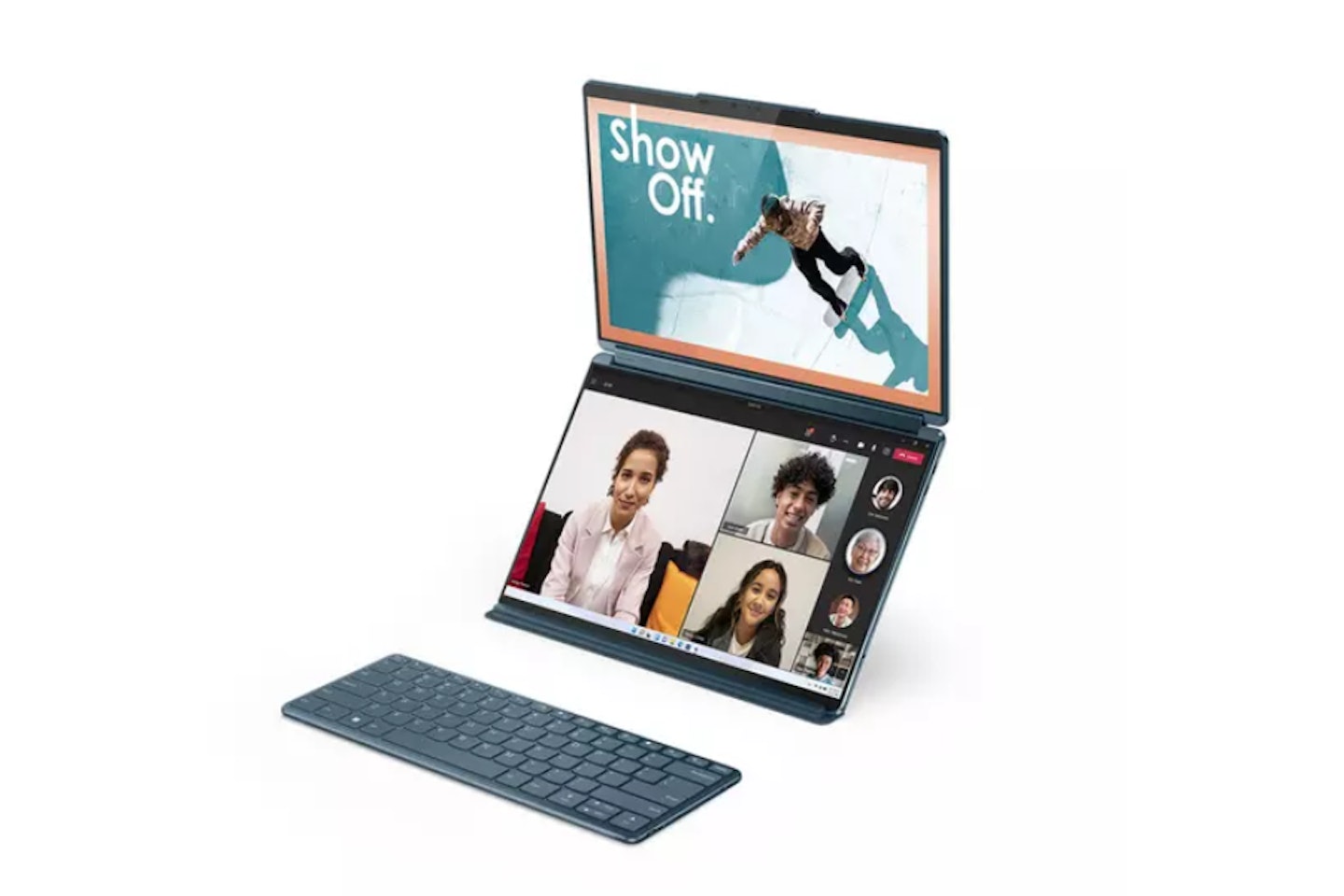 Lenovo
Lenovowww.currys.co.uk
Coming in a little cheaper than the Zenbook DUO is the Lenovo Yoga Book i9. Despite being less powerful with 16GB of RAM and an Intel i7 CPU, it's still a very capable machine that delivers on the promise of a dual-screen laptop. The 13.3-inch screens are OLED too, and there's a stylus included.
Pros
- Twin 13.3-inch 2.8K OLED touchscreens for great productivity and multitasking
- Dolby Vision and Bowers & Wilkins speakers with Dolby Atmos for superior audio-visual performance
- Included Lenovo Digital Pen 3
Cons
- Not as powerful as the Zenbook DUO OLED
| CPU | Intel Core i7 1355U Processor |
| GPU | Intel Iris Xe Graphics |
| RAM | 16GB |
| Storage | 1TB SSD |
| Display | Two 13.3-inch OLED touchscreens, 2.8K (2880 x 1800), DisplayHDR |
| Battery life | Around 7.5 hours under average use |
| Dimensions | 29.91 x 20.39 x 1.6 cm |
| Weight | 1.34kg (with keyboard) |
If you like the idea of a little more screen space but don't need two full-size displays, this alternative from ASUS is ideal. The Zenbook DUO UX482EAR 14-inch laptop includes a tiltable smaller screen just above the keyboard. That could be all the space you need for an editing timeline, tool panels or just some open notes. The hardware spec is also respectable for the price, with 16GB of RAM and a 1TB SSD.
Pros
- Innovative dual-screen design makes for faster, easier workflow and tool space
- A solid mid-range spec with enough power to run professional applications
- The included ASUS Pen gives creatives extra editing control
Cons
- The second screen may take some getting used to
| CPU | Intel i7-1195G7 |
| GPU | Intel integrated |
| RAM | 16GB |
| Storage | 1TB SSD |
| Display | 14-inch full-HD dual touchscreen |
| Battery life | Up to 12 hours |
| Dimensions | 32.4 x 1.73 x 22.2 cm |
| Weight | 1.57 kg |
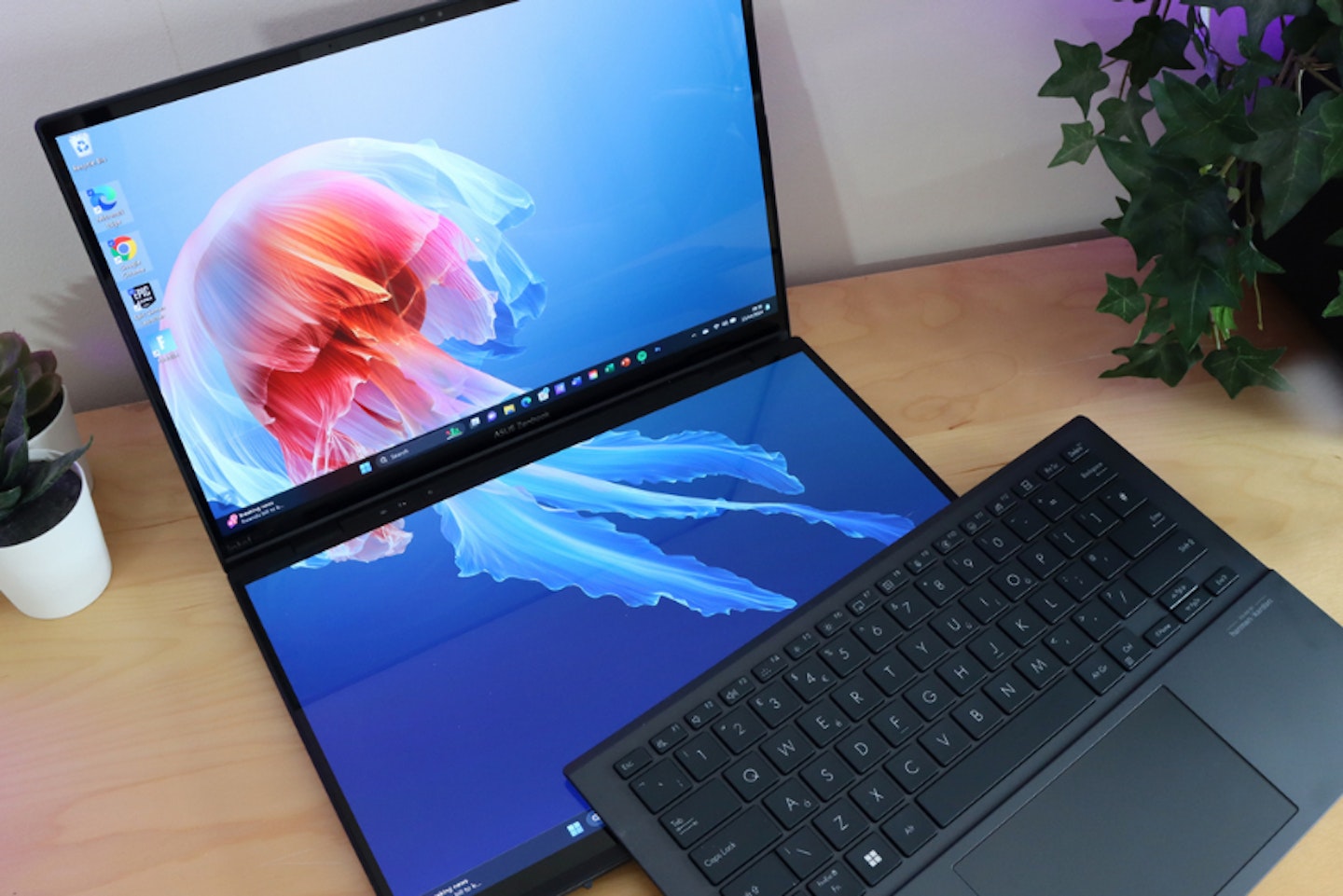
Final thoughts
Who is it for?
This machine is clearly aimed at anyone who is often frustrated by the single-screen laptop experience. Multitaskers who love to have multiple browser windows open, or those who write on one screen and have research notes open on the other, will see their productivity go through the roof. Likewise, anyone who needs to spread a single professional application across two screens - such as design software - will never go back to a single-screen laptop again after trying out the Zenbook DUO OLED. Gorgeous dual displays aside, this laptop has the computing brawn and speed to deliver slick performance for power users - making it a true desktop replacement.
Would we recommend it
After testing the ASUS Zenbook DUO OLED for around three weeks I think it’s one of the best laptops I’ve ever used. In single-screen mode, it’s a classy piece of kit with a solid and responsive keyboard and touchpad. The touchscreen OLED display is a practical addition in terms of extra control. It also loads and runs heavy-duty applications with speed, making it ideal for professionals and creatives.
But, in dual-screen mode, the whole experience is truly enhanced. Not only is it amazing for productivity and workflow - making it a multitasker’s dream - but it’s also simply stunning to look at. The twin 14-inch OLED screens really pop, are easy on the eye for longer sessions and bring all of your entertainment and media to life. Sound is surprisingly solid for a laptop too, with Dolby Atmos in good effect for movies that support it. The detachable keyboard and trackpad also transform this into a mobile workstation, allowing for a comfortable typing position with a raised screen. With this Zenbook DUO OLED laptop, ASUS really have achieved a world-first worth shouting about.
Shop this product
Who tested it?
Chris Duffill is one of our senior commercial content writers specialising in audiovisual and computing. He's also been a graphic designer and videographer, using professional creative software on a wide variety of laptops and desktop computers over the last two decades.
How was it tested?
I used the ASUS Zenbook DUO OLED laptop for over three weeks. It arrived with Windows 11 Home and I installed all of the available updates. It was used with the latest versions of Adobe Photoshop, Office 365, the Spotify app, Microsoft Edge, the Prime Video app and the EPIC Game Launcher.
Chris Duffill is a Senior Tech Product Writer for What's The Best. His background includes writing, editorial, marketing, design, video production and photography.
He specialises in home entertainment and audiovisual tech, including speakers, amplifiers, turntables, streaming media players, and TVs. He is also one of our resident experts in computing (PCs, tablets, smartphones, smartwatches), DSLR photography and all kinds of digital cameras. He also writes about retro gaming, game consoles and various electronic gadgets. If it plugs in, lights up or makes a noise, he’ll write about it.
Subscribe to the What’s The Best Newsletter to keep up to date with more of the latest reviews and recommendations from the rest of the What’s The Best team.
